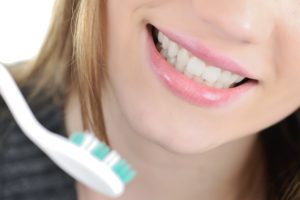 Strong teeth. They’re everyone’s goal—and not as hard to get as you might think (but it is really easy to weaken them!). Here’s how to make and keep your teeth strong easily.
Strong teeth. They’re everyone’s goal—and not as hard to get as you might think (but it is really easy to weaken them!). Here’s how to make and keep your teeth strong easily.
Eat calcium-rich foods.
One of the easiest ways to strengthen your teeth is to make sure you have plenty of calcium-rich foods in your diet. Dairy foods like yogurt, milk, and cheese can strengthen your enamel. If you need to avoid dairy, almonds, kale, and sardines can also contribute to making your enamel stronger.
Stay hydrated (but not with soda or sugary drinks).
Acid is the enemy of teeth enamel, which is why water is a key ingredient in strengthening your teeth. Water washes the acid away from your teeth (and, as a bonus, is calorie free!). On the flip side, avoid soda or other sugary drinks that can weaken the enamel. If you do enjoy a soda, drink water as soon as you can after you are done.
Be gentle when you brush.
Hard brushing may seem like the best way to get your mouth completely clean, but it can also damage your enamel. Brush gently on your teeth and gums to keep your teeth strong (more tips for good brushing here), and make sure you floss before or after.
Schedule regular dentist appointments.
Your dentist can have a large input in the strength of your teeth. In addition to regularly cleaning and keeping your teeth healthy, your dentist also can help you spot any enamel issues before they become a problem at dentist appointments—and give you ways to fix it.
Add fluoride in to your routine.
Flouridated toothpaste, water, mouthwashes, and other products can strengthen enamel and lessen the effects of acid in your mouth. To strengthen enamel, add a product with fluoride to your routine to make your teeth stronger and less susceptible to decay.
Treat the grind (and the acid reflux).
Teeth grinding, called bruxism, occurs when a person clenches their jaw and grinds their teeth (more information about teeth grinding here). A person with bruxism may not even know it, such as when it happens at night. Common symptoms of bruxism are a dull headache or soreness in the jaw. Bruxism can damage your teeth enamel, and it’s not the only culprit. Acid reflux can also damage your teeth enamel, so make sure you keep these conditions in check for the good of your teeth (especially your enamel!).





